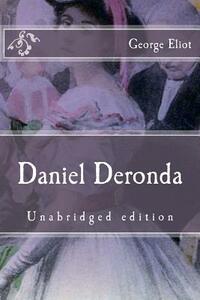Take a photo of a barcode or cover
George Eliot is an amazing author with her command of elegant language and complex character development. Middlemarch and Silas Marner showcase her talent the best in my opinion, though I have not yet read Mill on the Floss. This is an ambitious novel featuring the self-centered and pampered Gwendolyn on one end of the spectrum and the pious Mirah at the other extreme. Daniel Deronda, as the main character, engages in a sort of dance between the world of privilege of English high society versus the stark contrast of impoverished Jews in England during the 1860s.
Eliot's boldness to challenge the status quo and enlighten her contemporaries with Jewish culture was admirable; however, the theology in this book was tedious. At times the verbage was so dense it required re-reading to get the full impact. Perhaps if I re-read the entire book, I would garner a new appreciation for all the subtleties, but life is too short and there are too many other books that I want to read first!
Eliot's boldness to challenge the status quo and enlighten her contemporaries with Jewish culture was admirable; however, the theology in this book was tedious. At times the verbage was so dense it required re-reading to get the full impact. Perhaps if I re-read the entire book, I would garner a new appreciation for all the subtleties, but life is too short and there are too many other books that I want to read first!
This book was definitely a challenge for me. I have never read such an ambitious book before, but it was a good experience! I really like Eliot's style of writing and all of the allusions portrayed in the book. I definitely want to keep reading things by Eliot in the future.
Having now read the majority of Eliot's bibliography, I have determined that the key factor of enjoyment for my reading of her novels is place. In The Mill on the Floss, the river is always there, leading the story with its changing tides and pace, its meandering curves. And then in Middlemarch, the book takes place in the small town that it is named after, with each family situated within it, and when they venture out their tales of city-life and adventure are merely noted in conversation, as Eliot does not take us there with her characters. I loved these two the most out of all the Eliot I read, and with Daniel Deronda, I felt my enjoyment was hindered by its scope. It is 850 pages, and although Middlemarch is a similar length, its aforementioned sense of place is what makes the story much smaller, as the scale is grander in the thoughts and philosophies of its characters.
Because Deronda is a massive and complex story. It charts not only the journeys of characters throughout Europe and, later, the Middle East, but it charts much larger topics of religion and identity. As such, it is easy to get lost within its pages, searching for some location to be rooted in, to set your feet upon the ground of some provincial town. This is what Deronda needed for me, but it sacrifices it in order to pursue its true message, rather than an analysis of country living and the human condition.
No. Instead, Daniel Deronda covers all aspects of love and romance in the context of family history and religion. It is concerned with how the blood that courses through our veins will come to lead us throughout our lives, and how the coincidences that we experience is simply a prophecy that is embedded within ourselves. I wrote somewhere in this book that "it's all just coincidence and connection," as I think Eliot pursues that beautiful idea of how we are magnetically attracted to one another, how some people are destined to be with each other. However, I appreciated more so how Eliot does not limit this view to merely romantic relationships. Instead, she articulates the importance of family and how we can be drawn together through friendship and familial affection. This made the book more complex, but I think it's such a beautiful idea that was described perfectly throughout. Some characters have these monologues that are essentially Eliot's voice musing on these ideas, and they are so valuable in their philosophy and how they centre the novel on a few key themes.
I will always prefer her novels with a strong sense of place, but Daniel Deronda will place you within your family lineage, hopefully to consider your place in the world and how those that follow you will forge their own - perhaps with a bit of you in them.
Because Deronda is a massive and complex story. It charts not only the journeys of characters throughout Europe and, later, the Middle East, but it charts much larger topics of religion and identity. As such, it is easy to get lost within its pages, searching for some location to be rooted in, to set your feet upon the ground of some provincial town. This is what Deronda needed for me, but it sacrifices it in order to pursue its true message, rather than an analysis of country living and the human condition.
No. Instead, Daniel Deronda covers all aspects of love and romance in the context of family history and religion. It is concerned with how the blood that courses through our veins will come to lead us throughout our lives, and how the coincidences that we experience is simply a prophecy that is embedded within ourselves. I wrote somewhere in this book that "it's all just coincidence and connection," as I think Eliot pursues that beautiful idea of how we are magnetically attracted to one another, how some people are destined to be with each other. However, I appreciated more so how Eliot does not limit this view to merely romantic relationships. Instead, she articulates the importance of family and how we can be drawn together through friendship and familial affection. This made the book more complex, but I think it's such a beautiful idea that was described perfectly throughout. Some characters have these monologues that are essentially Eliot's voice musing on these ideas, and they are so valuable in their philosophy and how they centre the novel on a few key themes.
I will always prefer her novels with a strong sense of place, but Daniel Deronda will place you within your family lineage, hopefully to consider your place in the world and how those that follow you will forge their own - perhaps with a bit of you in them.
This novel is a revelation. I am astonished by its sensitive, accurate, detailed portrait of spiritual psychology. Eliot shows unprecedented skill in tracing the delicate movements of the mind or soul toward religion. I lived whole lifetimes as I listened to the Librivox recording of it.
challenging
emotional
reflective
slow-paced
Plot or Character Driven:
A mix
Strong character development:
Yes
Loveable characters:
Complicated
Diverse cast of characters:
Yes
Flaws of characters a main focus:
Yes
emotional
inspiring
reflective
slow-paced
Daniel Deronda by George Eliot is a novel that came to my attention several years ago. Due to one reason or another, it has taken me ages to finally sit down and read it. Was it worth the wait? Well, it certainly wasn’t a waste of time. I can see why many consider this novel to be a classic and Eliot’s best work.
The Good:
Characters: Most of the characters are rather likable. It’s a bit rare in these kinds of novels to have a lot of nice people wandering around. While Gwendolen Harleth isn’t all together likable, she’s at least rather fascinating.
Plot: Jewish faith and culture play a large role in the novel, and it’s done respectfully. Actually, a lot of the plots- in Daniel Deronda’s side of things - are rather well done and interesting. They certainly kept my interest. Having only watched the 2002 miniseries before, it was lovely to dive deeper into the past of many of the characters. Suddenly Mirah and her brother had their own lives; the stuff with their father, Mirah’s sad past – it all came alive. I also rather enjoyed seeing Deronda’s inner thoughts in regard to his parentage and his growing love and understanding of the Jewish faith and culture. Even Hans and his lovely family came more alive on the page.
Writing Style: It doesn’t always read like a lot of novels from the same time period – and that’s a good thing. It feels like a mix of social satire (most of Gwendolen’s story) and of morals and people’s places in the world. People, who might not have been seen as sympathetic in other novels, are shown with a sympathetic and understanding eye.
The Meh:
Characters: I can understand why some people have said that Gwendolen Harleth is one of the most complicated and fascinating characters in Victorian literature. I can also understand how some can view her as a naïve, manipulative, selfish, satire of the “modern day heroine”. I’m sure people could (and have) written whole papers on Gwendolen Harleth. On a totally personal note: I found her to be selfish and manipulative and immature; however, I pitied her. Mostly because she kept making terrible choices and didn’t seem to grow until half-way into the story. Though, I suppose that is alright, considering that none of the other characters had much character growth either. And why couldn’t Daniel admit his feelings for Mirah (especially to himself) until after he found out he was a Jew? I get the times, but he had already met a person who had married outside their religion.
Plot: Many people say that the novel is two stories: one that deals with Gwen, her family, her marriage, and those around her; the other deals with Daniel’s parentage and the Jewish community of London, as well as the reunion of Mirah and her brother. It certainly felt that way to me. And I wonder if the novel couldn’t have been two companion novels, each standing on their own, with Daniel being the connection. I know some countries have just punished Daniel’s story.
The Bad:
Plot/Writing Style: While I enjoyed the overall plots and subplots (and they were all written wonderfully) I did think that at 710 pages the novel was a bit long. There were a few scenes that could have been shorter or cut all together.
Overall, I enjoyed the novel more than I thought I would. I give it a 3.3 out of 5 stars. More people should give Daniel Deronda a read.
The Good:
Characters: Most of the characters are rather likable. It’s a bit rare in these kinds of novels to have a lot of nice people wandering around. While Gwendolen Harleth isn’t all together likable, she’s at least rather fascinating.
Plot: Jewish faith and culture play a large role in the novel, and it’s done respectfully. Actually, a lot of the plots- in Daniel Deronda’s side of things - are rather well done and interesting. They certainly kept my interest. Having only watched the 2002 miniseries before, it was lovely to dive deeper into the past of many of the characters. Suddenly Mirah and her brother had their own lives; the stuff with their father, Mirah’s sad past – it all came alive. I also rather enjoyed seeing Deronda’s inner thoughts in regard to his parentage and his growing love and understanding of the Jewish faith and culture. Even Hans and his lovely family came more alive on the page.
Writing Style: It doesn’t always read like a lot of novels from the same time period – and that’s a good thing. It feels like a mix of social satire (most of Gwendolen’s story) and of morals and people’s places in the world. People, who might not have been seen as sympathetic in other novels, are shown with a sympathetic and understanding eye.
The Meh:
Characters: I can understand why some people have said that Gwendolen Harleth is one of the most complicated and fascinating characters in Victorian literature. I can also understand how some can view her as a naïve, manipulative, selfish, satire of the “modern day heroine”. I’m sure people could (and have) written whole papers on Gwendolen Harleth. On a totally personal note: I found her to be selfish and manipulative and immature; however, I pitied her. Mostly because she kept making terrible choices and didn’t seem to grow until half-way into the story. Though, I suppose that is alright, considering that none of the other characters had much character growth either. And why couldn’t Daniel admit his feelings for Mirah (especially to himself) until after he found out he was a Jew? I get the times, but he had already met a person who had married outside their religion.
Plot: Many people say that the novel is two stories: one that deals with Gwen, her family, her marriage, and those around her; the other deals with Daniel’s parentage and the Jewish community of London, as well as the reunion of Mirah and her brother. It certainly felt that way to me. And I wonder if the novel couldn’t have been two companion novels, each standing on their own, with Daniel being the connection. I know some countries have just punished Daniel’s story.
The Bad:
Plot/Writing Style: While I enjoyed the overall plots and subplots (and they were all written wonderfully) I did think that at 710 pages the novel was a bit long. There were a few scenes that could have been shorter or cut all together.
Overall, I enjoyed the novel more than I thought I would. I give it a 3.3 out of 5 stars. More people should give Daniel Deronda a read.
This was one of those books I was sorry to read in such a stressed time and in english (not my native language), as I feel that I missed some details that would made me love this reading even more, if that's possible since I feel I've already surrendered to this author.
We follow the destinies of Daniel Deronda and Gwendolen Harleth, who come to meet by chance in Leubronn, Germany, a place known by its gambling. Then we go back in time to see what lead both to that place. The first, brought up by Sir Hugo Mallinger without knowing his true origin, we know as having a tendency to help others without caring about himself. On the other hand, Gwendolen is presented as a spoiled girl, incapable of truly loving other people, with the exception of her mother. The meeting of these two souls will have an impact on both lives to the future, and we have the chance to follow them and see how their destinies intertwine.
This is a very descriptive book, namely in what concerns the characters, their inner fights and thoughts. I confess I didn't love the major characters; however their change, their growth is perceptible, especially when it comes to Gwendolen. But the same descriptive detail was put on the secondary characters and let me point out the strength of the female characters that, even facing adversity, do not give up and get to declare themselves against the role society had set for them. We even get to know a female character who confesses herself in love with the stage, that refuses her role as a mother for not having love to give as that love was given to the stage, to her career. In the 19th century, in the Victorian period, this must have been controversial, as must have happened with the strong Judaic theme of this novel.
This is a romance not to be taken lightly. It criticizes the society of the 19th century, namely the marriages by convenience, but it also thrives on the Judaic movement that at that time was getting some followers and demanded the existence of a Judaic state (the state of Israel) in the Palestine, which was granted in the 20th century, after the World War II, and where even today conflicts are part of the world news.
I recommend it. It's a phenomenal book and was sorry, as I said, of thinking that I didn't get everything it had to offer. There are many subtleties, characters nicely built and a coherent story, with a twist here and there, and very pleasant to follow. Without a doubt, a book to keep and re-read.
We follow the destinies of Daniel Deronda and Gwendolen Harleth, who come to meet by chance in Leubronn, Germany, a place known by its gambling. Then we go back in time to see what lead both to that place. The first, brought up by Sir Hugo Mallinger without knowing his true origin, we know as having a tendency to help others without caring about himself. On the other hand, Gwendolen is presented as a spoiled girl, incapable of truly loving other people, with the exception of her mother. The meeting of these two souls will have an impact on both lives to the future, and we have the chance to follow them and see how their destinies intertwine.
This is a very descriptive book, namely in what concerns the characters, their inner fights and thoughts. I confess I didn't love the major characters; however their change, their growth is perceptible, especially when it comes to Gwendolen. But the same descriptive detail was put on the secondary characters and let me point out the strength of the female characters that, even facing adversity, do not give up and get to declare themselves against the role society had set for them. We even get to know a female character who confesses herself in love with the stage, that refuses her role as a mother for not having love to give as that love was given to the stage, to her career. In the 19th century, in the Victorian period, this must have been controversial, as must have happened with the strong Judaic theme of this novel.
This is a romance not to be taken lightly. It criticizes the society of the 19th century, namely the marriages by convenience, but it also thrives on the Judaic movement that at that time was getting some followers and demanded the existence of a Judaic state (the state of Israel) in the Palestine, which was granted in the 20th century, after the World War II, and where even today conflicts are part of the world news.
I recommend it. It's a phenomenal book and was sorry, as I said, of thinking that I didn't get everything it had to offer. There are many subtleties, characters nicely built and a coherent story, with a twist here and there, and very pleasant to follow. Without a doubt, a book to keep and re-read.
adventurous
emotional
reflective
tense
medium-paced
challenging
emotional
informative
inspiring
reflective
slow-paced
Plot or Character Driven:
Character
Strong character development:
Yes
Loveable characters:
Complicated
Diverse cast of characters:
No
Flaws of characters a main focus:
Yes
Such a difficult book to read, I could only read a few pages per day. The plot was interesting but very slow to develop. A beautiful ending, but most of the action is concentrated in a few chapters. Be patient when reading.





